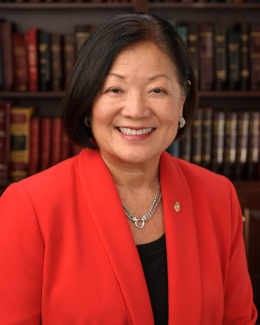Mazie Hirono
| Name | Mazie Hirono |
|---|---|
| Born | November 3 1947 |
| Birth Location | Fukushima, Japan |
| Generational Identifier |
The first Asian American women to be elected to the United States Senate. Mazie Keiko Hirono was born on November 3, 1947, on her grandparents' rice farm in a small village near Sendai in Fukushima prefecture, Japan. Her mother, Laura Chie Hirono, was a Nisei who was born in Waipahu, Hawai'i and who had returned to Japan with parents as a teenager. Mazie's father had drinking and gambling problems, and her parents' marriage broke up. In 1955, Laura escaped to Hawai'i with Mazie and her older brother, working two jobs to support the family. Mazie attended public schools—speaking no English when she started—and eventually graduated from Kaimuki High School in 1966. She went on the University of Hawai'i, where she graduated with a degree in psychology in 1970. Having become politicized on campus, she worked on local Democratic campaigns and as an aide to state representative James Wakatsuki before leaving for Georgetown University Law Center, where she graduated with a law degree in 1978. Upon her return to Hawai'i, she worked as a deputy attorney general for the state in the antitrust division before deciding to seek political office herself.
She won election to the state house in 1980 as a Democrat and won reelection six times. In 1994, she was elected lieutenant governor, serving two terms alongside Governor Ben Cayetano. She ran for governor in 2002, winning the Democratic primary over Ed Case, but losing to Republican Linda Lingle in the general election. Over the next four years, she taught in Japan, co-chaired the John Kerry presidential campaign in 2004, and formed the Patsy T. Mink Political Action Committee. When Case, who had been elected to one of Hawai'i's two seats in the House of Representatives in 2004, stepped down to challenge incumbent Senator Daniel Akaka in 2006, Hirono ran for the open seat. She beat out ten Democratic candidates for the nomination, edging Colleen Hanabusa by just 800 votes. She defeated Bob Hogue in the general election. After serving three terms in the house, Hirono ran for the Senate seat vacated by Akaka's retirement, winning the primary over Case and the general election in a rematch with Lingle by a 62-37 margin. In addition to being the first Asian American woman senator and Hawai'i's first woman senator, she was also the first Japanese immigrant member of Congress.
Married in 1989 to Leighton Kim Oshima, she has no children.
Considered a liberal Democrat—"I consider myself a person who cares about other people. If that makes me a liberal, so be it," she told Mike Markrich—her voting record shows her voting with the majority of Democrats nearly all the time. [1] She has displayed particular interest in education and transportation related issues, both of particular importance to Hawai'i. Hirono has supported efforts to preserve World War II Japanese American confinement sites, particularly the sites in Hawai'i. In 2009, she co-sponsored legislation that led to a special resources study by the National Park Service on Honouliuli .
For More Information
Official website, http://www.hirono.senate.gov/ .
Markrich, Mike. "Sweet Victory for Mazie Hirono." The Hawai'i Herald , Dec. 1, 2006, 1–2.
"Mazie Hirono." Honolulu Civil Beat, http://www.civilbeat.com/topics/mazie-hirono/ .
Stone, Scott C. S. Living Legacy: Outstanding Japanese Women of the 20th Century in Hawai'i . Honolulu: Japanese Women's Society Foundation, 2002.
Yamanaka, Cedric. "Mazie Hirono: Facing a Major 'Challenge.'" The Hawai'i Herald , Dec. 2, 1994, 1, 13.
Footnotes
- ↑ Mike Markrich, "Sweet Victory for Mazie Hirono," The Hawai'i Herald , Dec. 1, 2006, 1; "Mazie Hirono," Honolulu Civil Beat, accessed on July 18, 2013 at http://www.civilbeat.com/topics/mazie-hirono/ .
Last updated March 28, 2015, 12:48 a.m..

 Media
Media